Washington Post suspends reporter who retweeted joke
‘The Five’ discuss The Washington Post melting down over a retweeted ‘sexist’ joke from one of their reporters.
The paper known for its slogan "Democracy Dies in Darkness" should perhaps be more concerned about its own well-being after the disastrous week it had.
The Washington Post, the once-revered news organization that famously exposed the Watergate scandal leading to a president's resignation, is still highly respected in the Beltway but has lost its way in recent years among most Americans. From declaring the coronavirus lab-leak theory was a "debunked" "conspiracy" to quickly rejecting the Hunter Biden laptop scandal in the final weeks of the 2020 presidential election, the Post of today is simply not the same as the Post of the Nixon era.
But the events that occurred over the past week may be some of the worst that have plagued the Washington Post in its 144-year history.
On Thursday, the Post was forced to address the controversial 2018 op-ed penned by actress Amber Heard, which became the center of the explosive defamation lawsuit launched against her by ex-husband Johnny Depp.
The op-ed, published just days before the release of her new film "Aquaman," Heard alleged she was the victim of domestic abuse, heavily implying Depp was her abuser without actually naming him. But during the stunning six-week trial, it was revealed that the ACLU had ghostwritten her op-ed. In the end, a jury found that Heard's piece against Depp was in fact defamatory.
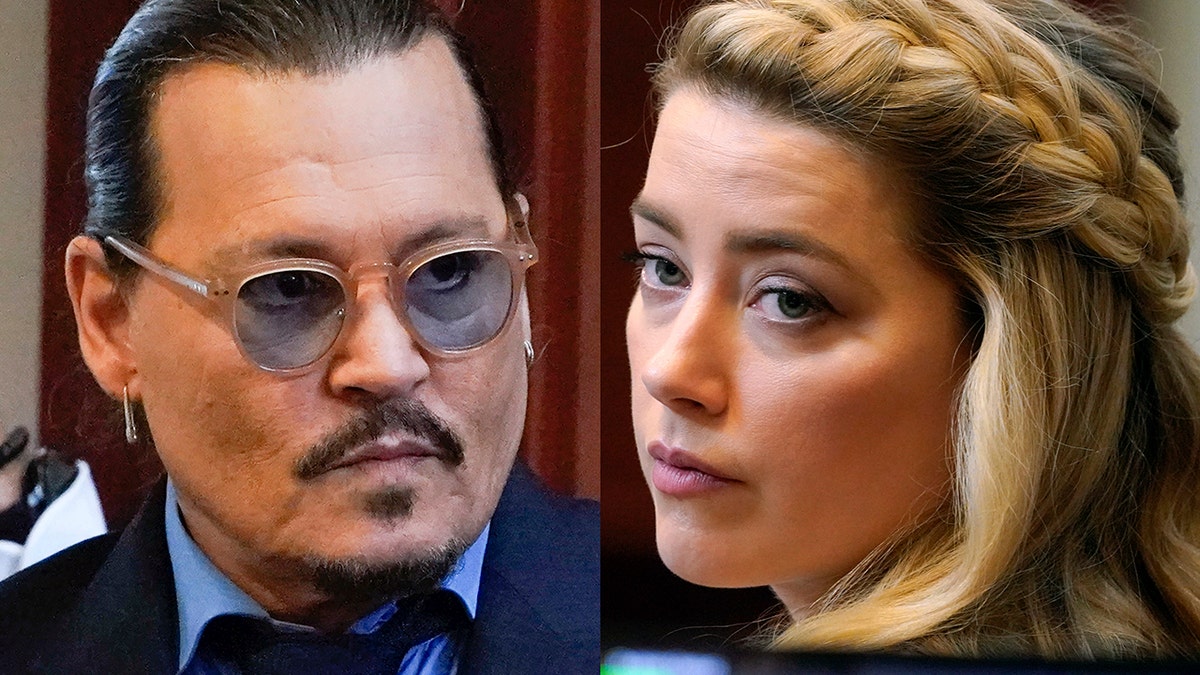
Johnny Depp sued Amber Heard after she wrote an op-ed piece in The Washington Post in 2018 referring to herself as a "public figure representing domestic abuse." (AP Photos/Steve Helber, Pool)
The following day, the Post issued an editor's note acknowledging the verdict.
"In 2019, Johnny Depp sued Amber Heard for defamation arising out of this 2018 op-ed. On June 1, 2022, following a trial in Fairfax County, Va. Circuit Court, a jury found Heard liable on three counts for the following statements, which Depp claimed were false and defamatory: (1) ‘I spoke up against sexual violence — and faced our culture’s wrath. That has to change.’ (2) ‘Then two years ago, I became a public figure representing domestic abuse, and I felt the full force of our culture’s wrath for women who speak out.’ (3) 'I had the rare vantage point of seeing, in real time, how institutions protect men accused of abuse,'" the note read, adding that the jury also found Depp had defamed Heard on one count through comments made by his lawyer Adam Waldman.
While the verdict was largely seen as an indictment of Heard's credibility, some critics argued the Post should also be held accountable for publishing her defamatory op-ed in the first place.
"The Washington Post- you can just do anything, you're just saying anything, and they have no responsibility, no skin in the game, they cause all the damage to Johnny Depp? But no- 'oh, she wants to say that he does this, that, the other thing we'll just publish it. We'll do no research on our own, no fact checking.' It's crazy," Barstool Sports founder Dave Portnoy told his Twitter followers last week. "And then when it's total bulls--- and a guy- his life has been destroyed, they're like 'Oops, we didn't know. Not our fault. Whoever we talked to wasn't totally truthful. We didn't do any digging. We just trusted them at their word. And we printed it ruined it, Nope not our fault.' … But if you ask me, the Washington Post should be held responsible as well. Like you gave her the platform, don't you- like, don't you have some responsibility to make sure what you publish isn't s---?"
That same Thursday, the Post published a report headlined, "Who won the Depp-Heard trial? Content creators that went all-in."
Authored by the Post's star "internet culture" columnist Taylor Lorenz, the article shined a light on how online influences thrived during the Depp-Heard trial. Cited in the piece were two YouTubers, "LegalBytes" host Alyte Mazeika and an anonymous user named ThatUmbrellaGuy, who Lorenz alleged had a spike in revenue for their coverage of the courtroom drama.
Included in the paragraph was a parenthetical statement reading, "Mazeika and ThatUmbrellaGuy did not respond to requests for comment."
Both Mazeika and ThatUmbrellaGuy pushed back at Lorenz's report, claiming that not only did she mischaracterize their coverage of the trial and their earnings but how she did not actually reach out to them for comment in the first place.
"Um. This says I didn't respond to requests to comment? I know I've gotten a lot of emails over the past two months, but I've just double checked for your name, @TaylorLorenz, and I see no email from you," Mazeika called out the Washington Post columnist. "Also, I didn't suddenly pivot. I started covering this before trial began."
"The Washington Post LIED and DID NOT contact me before including me in their story on Johnny Depp, despite reporting they did so," ThatUmbrellaGuy tweeted, sharing time stamps of his tweet calling out the article and Lorenz's email to him sent minutes later.
He later continued, "The Washington Post also FLAGRANTLY misrepresented my earnings report and needs to correct it. Social Blade says I made between $4.9k and $79.1k. They ADDED TO the highest estimate, overreporting for dramatic effect."
Following the public slamming of Lorenz and the Post, the Post stealth-edited her piece, removing the erroneous statement without including an editor's note.
It wasn't until after Fox News published its report on Friday about the discrepancy between Lorenz and the YouTubers when the Post finally issued a correction at the bottom of her report, reading, "A previous version of this story inaccurately attributed to Adam Waldman a quote describing how he contacted some Internet influencers. That quote has been removed. The story has also been amended to note The Post’s attempts to reach Alyte Mazeika and ThatUmbrellaGuy for comment. Previous versions omitted or inaccurately described these attempts."
QUESTIONS REMAIN AS TAYLOR LORENZ BLAMES EDITOR, ‘BAD FAITH CAMPAIGN’ OVER ERRONEOUS WAPO REPORT
The Post later issued a second, lengthier correction, this time at the top of the article shedding light on what had allegedly transpired.
"The first published version of this story stated incorrectly that Internet influencers Alyte Mazeika and ThatUmbrellaGuy had been contacted for comment before publication. In fact, only Mazeika was asked, via Instagram," The Post wrote. "After the story was published, The Post continued to seek comment from Mazeika via social media and queried ThatUmbrellaGuy for the first time. During that process, The Post removed the incorrect statement from the story but did not note its removal, a violation of our corrections policy. The story has been updated to note that Mazeika declined to comment for this story and ThatUmbrellaGuy could not be reached for comment."
Late on Friday, the Post quietly relabeled the lengthy correction to read "editor's note" instead.
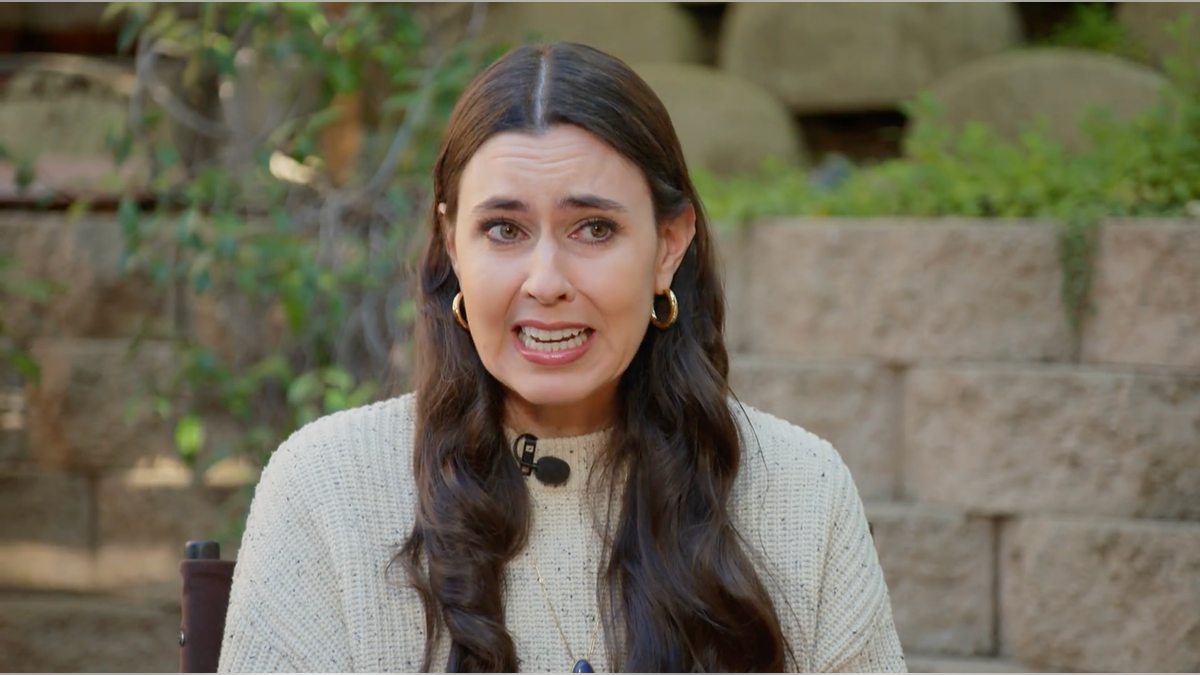
Washington Post columnist Taylor Lorenz is facing intense scrutiny for her erroneous report published last week. (MSNBC)
Except that correction warrants another correction, at least according to Mazeika, who said Lorenz never contacted her on Instagram prior to publication.
Fox News obtained a screenshot of Lorenz's direct message on Instagram to Mazeika with a time stamp showing the columnist reached out after her story was published.
In fact, Lorenz began her message by saying, "Hi there! I tried reaching out to you on Twitter also," meaning she had already tried contacting her on Twitter prior to Instagram - as time stamps seen by Fox News show, all were after publication.
Mazeika called out the falsehood on Twitter, telling The Post, "Please stop lying and take the L."
In a statement to Fox News, Mazeika said the incident "appears to be a microcosmic example of bigger issues going on in mass media these days" which is "the reason why I was attracted to live-streaming every minute" of the Depp-Heard trial.
A spokesperson for the Washington Post declined to comment on the record regarding this specific dispute.
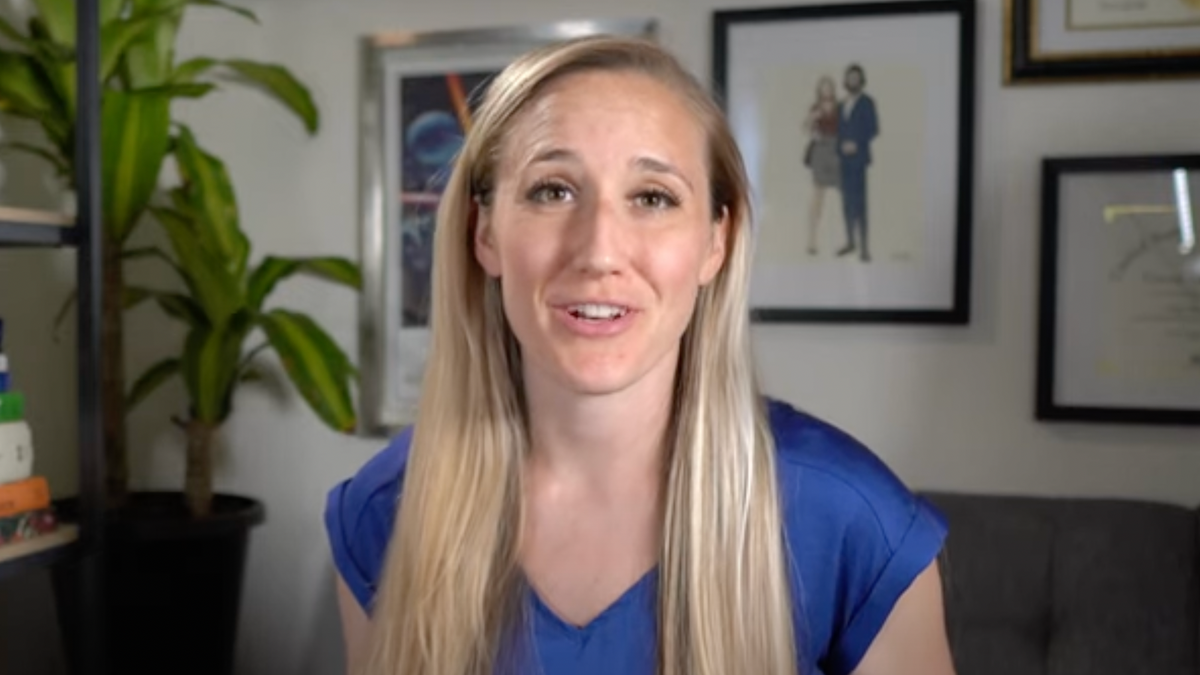
"LegalBytes" host Alyte Mazeika pushed back against Taylor Lorenz's report allegeding the columnist contacted her before publishing. ("LegalBytes")
On Saturday, Lorenz attempted to set the record straight, citing "miscommunication" and blaming her editor all while suggesting any scrutiny of her reporting is a "bad faith campaign" against her and the Washington Post.
"Last Thursday, an incorrect line was added to a story of mine before publishing due to a miscommunication with an editor. I did not write the line and was not aware it was inserted. I asked for it to be removed right after the story went live," Lorenz began a lengthy Twitter thread on Saturday afternoon. "The line was a sentence saying that I reached out to 2 YouTubers for comment for my story. The inclusion of the YouTubers was only in passing, citing another outlet’s reporting."
"After the story went live, I reached out to both YouTubers mentioned in that sentence just to be extra sure there wasn't some sort of commentary they wanted to add," Lorenz wrote, contradicting the Post's second correction about her outreach via Instagram.
Lorenz went on to downplay the importance of the YouTubers in her story, tweeting, "Neither provided comment for the story and both continued to post about me. The mention of these two individuals was not remotely the focus of my story. It's become a huge distraction. I spoke to over two dozen creators for my story about the trial, along with other experts who are quoted in the piece."
"This should have been a small correction for a miscommunication, but it turned into a multi-day media cycle, intentionally aimed at discrediting the Washington Post and me," Lorenz claimed. "We have a responsibility to recognize these bad faith campaigns for what they are and when these sorts of things do and do not warrant acknowledgment… Bad actors recognize the Washington Post's earnest desire to hear and incorporate feedback, and they exploit that."
She then added, "I know that the stuff I write about and go through is hugely unfamiliar to the vast majority of people in media! I have great hope that all of us can learn from this experience."
Lorenz, who is seen as a legacy media darling, remained so defiant that she even attacked allies like CNN media reporters Brian Stelter and Oliver Darcy for the mildest coverage they gave to the controversy.
A spokesperson for the Washington Post sent Lorenz's Twitter thread to Fox News in response to a previous inquiry, saying "This should largely answer your questions."
Except it did not. In fact, many questions remain unanswered.

Taylor Lorenz remains defiant as critics take aim at the Washington Post columnist for her lack of journalistic ethics. (Photo by Jerod Harris/Getty Images)
Not mentioned in Lorenz's Twitter thread was the Post's erroneous correction claiming she attempted to contact one of the YouTubers via Instagram prior to publication, which she contradicted in her Twitter thread when she admitted to reaching out to both YouTubers "after the story went live."
Other questions that remain include whether the individual who made the stealth edit has been reprimanded for violating the Post's editorial policies, whether Lorenz was dishonest to her employer about her effort to reach one of the YouTubers and if there would be repercussions as a result. What also remains to be seen is an explanation as to why the Post relabeled its correction as an "editor's note" and if that change was upon Lorenz's request.
Fox News reached out to the Washington Post with these various inquiries. The Post declined to comment. Lorenz did not respond to multiple requests for comment.
Meanwhile, another controversy was brewing between two reporters over an off-colored retweet.
Washington Post reporter Felicia Sonmez shared a screenshot of a tweet written by YouTube host Cam Harless, who said, "Every girl is bi. You just have to figure out if it’s polar or sexual."
That joke, as seen in Sonmez's screenshot, was retweeted by fellow reporter David Weigel.
"Fantastic to work at a news outlet where retweets like this are allowed!" Sonmez reacted.
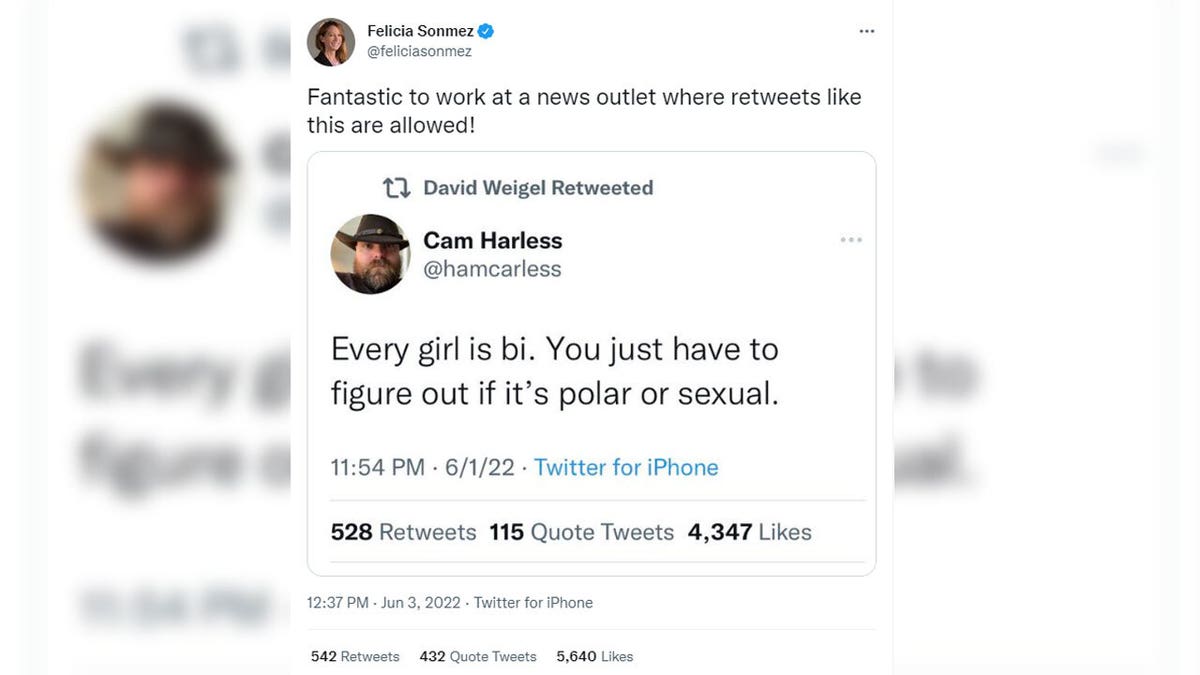
Washington Post reporter Felicia Sonmez called out both her colleague David Weigel and the paper itself over a tweet he shared mocking women. (Twitter)
The Washington Post condemned the retweet, telling Fox News, "Editors have made clear to the staff that the tweet was reprehensible and demanding language or actions like that will not be tolerated."
Weigel also removed the retweet from his Twitter page and issued an apology, saying he "did not mean to cause any harm."
CNN broke the news on Monday that Weigel was placed on a one-month unpaid suspension.
Weigel did not respond to Fox News' requests for comment. An auto-response from Weigel's work email replied, "I am out of the office and will return on July 5." A spokesperson for the Washington Post declined to comment on the personnel matter.
Critics blasted the Post for its harsh punishment of Weigel, calling the paper's actions "completely insane." But according to Puck News, "at least three previous instances in which his tweets had been flagged to H.R. for violating the Post’s social media policy" may have contributed to the suspension.
Notably, Weigel did come to Sonmez's defense in 2020 when she landed in hot water and was briefly suspended by the Post for tweets reviving Kobe Bryant's 2003 rape accusation during the breaking news of the NBA superstar's helicopter crash as his body was still being recovered. She was reinstated after the Post concluded she did not violate the company's social media policies.
Sonmez did not draw any parallels, writing, "One of these was a tweet that violated the Post’s social media policy and promoted a sexist ‘joke.’ The other was not."
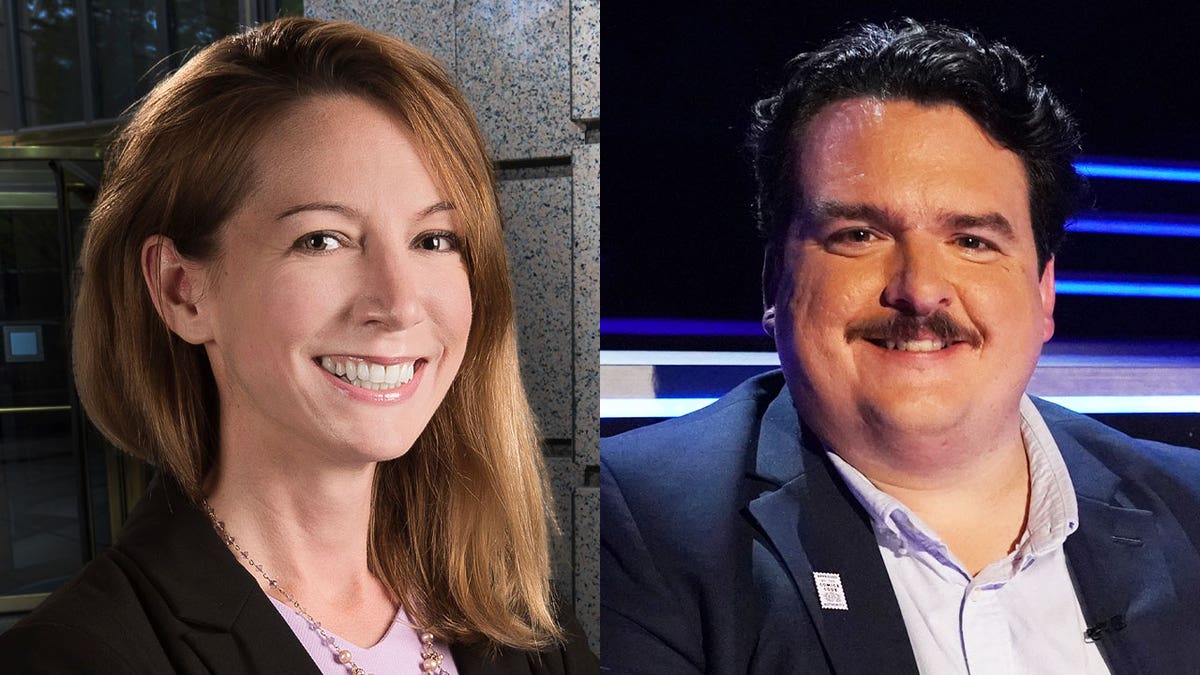
Washington Post reporters Felicia Somnez and David Weigel (Eric McCandless via Getty Images)
Sonmez's public shaming of Weigel prompted pushback from fellow Post reporter Jose A. Del Real.
"Felicia, we all mess up from time to time. Engaging in repeated and targeted public harassment of a colleague is neither a good look nor is it particularly effective. It turns the language of inclusivity into clout chasing and bullying. I don’t think this is appropriate," Del Real told Sonmez, adding, "Dave’s retweet is terrible and unacceptable. But rallying the internet to attack him for a mistake he made doesn’t actually solve anything. We all mess up in some way or another. There is such a thing as challenging with compassion."
"Jose, Dave’s retweet was indeed terrible and unacceptable. It was also public, and it’s important that all those who saw Dave’s tweet also see Washington Post reporters standing up for our newspaper’s values — one of which is that comments denigrating women will not be tolerated," Sonmez replied.
After Del Real urged Sonmez to "reconsider the cruelty you regularly unleash against colleagues," which she denied, he wrote, "I reject your attempt to make a specific critique of your regular public bullying into a sweeping opera about principles."
The ugly spat prompted Washington Post executive editor Sally Buzbee to issue a memo to staff urging them to "treat each other with respect and kindness," which apparently fell on deaf ears as Sonmez continued her barrage of attacks on Del Real as well as her editors, accusing them of selectively enforcing its social media policies.
On Tuesday, Buzbee attempted to further cool the temperature in the newsroom by sending a second memo calling for employees to be "collegial" to one another.
"In this newsroom, we share many important common values: a belief in the power of journalism. Hatred of racist or sexist behavior, language or systems. A conviction that when people come together in good faith, with respect and trust, it creates an environment that enables each person to do powerful and important work. We also occasionally disagree: We come from different backgrounds and experiences, and we each see the world differently. That combination of shared values and diversity of viewpoints is our greatest strength," Buzbee began the memo obtained by Fox News.

Washington Post executive editor Sally Buzbee struggles to rein in the Twitter warfare among her colleagues. (Celeste Sloman for the Washington Post)
Buzbee then listed policies the Post will enforce "in the strongest of terms."
"We do not tolerate colleagues attacking colleagues either face to face or online," Buzbee wrote. "Respect for others is critical to any civil society, including our newsroom. The newsroom social media policy points specifically to the need for collegiality."
She continued, "We also do not tolerate violations of our Policy Prohibiting Workplace Harassment and our Policy on Prohibition of Discrimination, which further set forth our expectations for employees and are designed to create an inclusive environment where all Post employees can perform their best work."
The Washington Post boss went on to address the Sonmez-Weigel spat, writing, "We respect and do not wish to inhibit any employee’s right to raise legitimate workplace issues. We know it takes bravery to call out problems. And we pledge to openly and honestly address problems brought to us. We moved quickly to show our intolerance for a sexist re-tweet sent by an employee last Friday."
"To be clear: We will enforce our policies and standards," Buzbee warned.
WASHINGTON POST BOSS DENOUNCES ‘ATTACKING COLLEAGUES’ IN MEMO TO STAFF AS WARFARE ON TWITTER ENSUES
Several Washington Post staffers took to Twitter to show solidarity in response to the memo, many of them echoing the same sentiment that the paper "isn't perfect" but praising colleagues as being "collegial" and expressing how they are "proud" to work there.
Except Sonmez mocked the "collegial" descriptor, highlighting how colleague Del Real had blocked her on Twitter following their dustup.
"So I hear The Washington Post is a collegial workplace," Sonmez quipped.
She then shared screenshots of Del Real's comments towards her, writing, "These tweets falsely accusing me of ‘clout chasing,’ ‘bullying,’ ‘cruelty’ and directing an ‘eager mob’ to carry out ‘a barrage online abuse’ are still up … even after I repeatedly raised them to management and noted that I’ve been receiving threats and abuse. Collegial!"
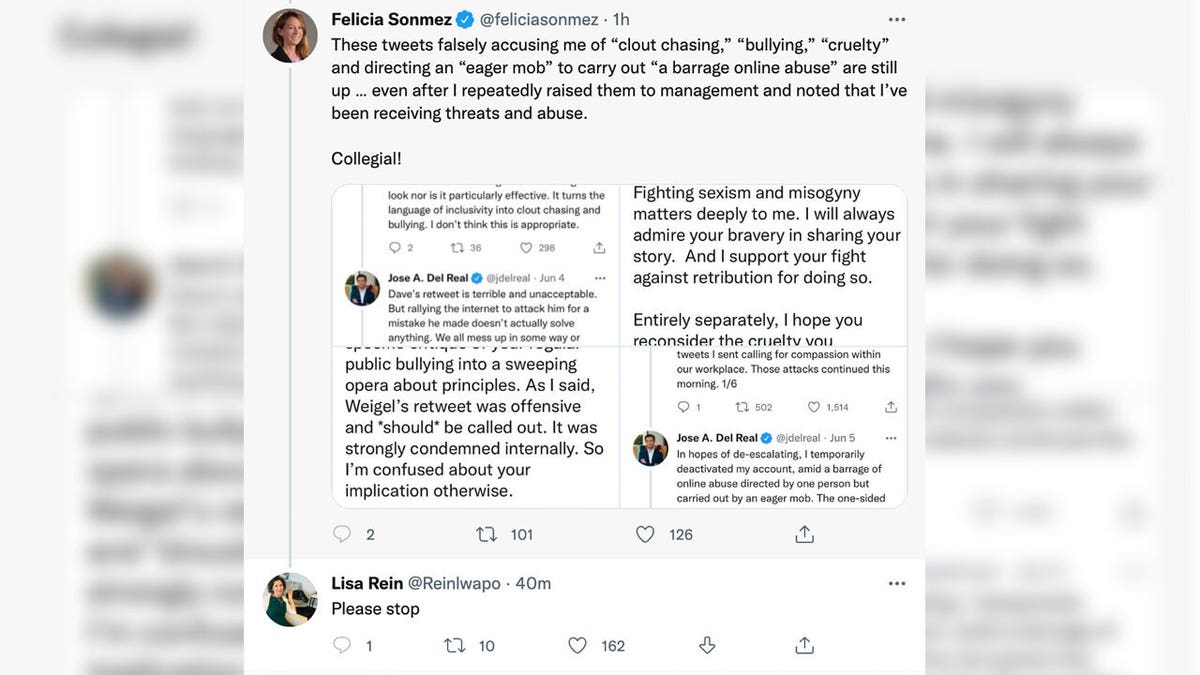
Washington Post reporter Lisa Rein urged Felicia Sonmez to "please stop" attacking colleagues. (Twitter)
That prompted the Post's federal government reporter Lisa Rein to wade in.
"Please stop," Rein pleaded to Sonmez.
Sonmez fired back, "Please stop … requesting that tweets from a colleague falsely accusing me of ‘bullying’ and 'clout chasing' be taken down?"
"Do you have any idea of the torrent of abuse I’m facing right now?" Sonmez asked Rein while sharing screenshots of various attacks being tweeted at her.
Rein's tweet was widely praised on Twitter with likes and retweets, but Sonmez's allies at the paper went after the veteran reporter.
WASHINGTON POST REPORTER URGES FELICIA SONMEZ TO ‘PLEASE STOP’ TWEETING ABOUT COLLEAGUES
"I scrolled through the likes on this tweet seemingly telling Felicia to stop fighting online abuse, and nearly all the verified accounts who have liked the tweet are men. All four of the @washingtonpost journalists who have liked the tweet are men. Is that not interesting to you?" Post software engineer Holden Saige Foreman asked Rein.
Washington Post video technician Breanna Muir put her complaint on full blast within the company, hitting reply all in response to Buzbee's memo complaint and wrote, "Does our company social media policy not apply to Lisa Rein for telling Felicia Sonmez to stop on Twitter? In all honesty, her comment doesn’t really sound collegial to me."
The paper's social media editor Nina Zafar previously rushed to Sonmez's defense in response to Del Real's tweets, mocking his "fragile feelings and lack of empathy" in a now-deleted tweet.

Washington Post reporter Lisa Rein urged her colleague Felicia Sonmez to "please stop" attacking her colleagues. (Photo by Wendy Galietta/The Washington Post via Getty Images)
According to Puck News' Dylan Byers, more than a dozen current and former Post employees he spoke with see Sonmez as an "internal threat to the paper’s reputation—not necessarily because she takes issue with the paper or its leadership, but because she often raises her concerns on Twitter instead of dealing directly with her colleagues or human resources."
One current Washington Post staffer is not as concerned about how the Twitter drama reflects on the company, telling Fox News Digital, "What matters is the quality of our journalism."
"It’s not something I would have done. But I’m not saying it was wrong," the staffer said about Sonmez's tweeting.
CLICK HERE TO GET THE FOX NEWS APP
But outside critics have called the tensions among the Post staff "so high school," leaving Substack writer Josh Barro asking, "Are There Any Adults at the Washington Post?"
"Airing internal workplace disputes in public like this is not okay, even when you are right on the merits… If you think your coworker sucks, you don’t tweet about it. That’s unprofessional. If you disagree with management’s personnel decisions, you don’t decry them to the public. That’s insubordinate. Organizations full of people who are publicly at each other’s throats can’t be effective," Barro wrote on Tuesday. "Del Real is right that Sonmez’s behavior is clout chasing and toxic, but it’s not his job to say so — that job falls to Post management. And just because Post management is weak and incompetent does not mean he gets to substitute his judgment for theirs, especially in a public forum."
Barro continued, "The staff apparently needs a sharp reminder that you do not air your disputes with colleagues in public. You’re supposed to be a team: You keep disagreements internal, and if you find the management or strategy or editorial direction of the organization unacceptable, you leave and work somewhere else."








































